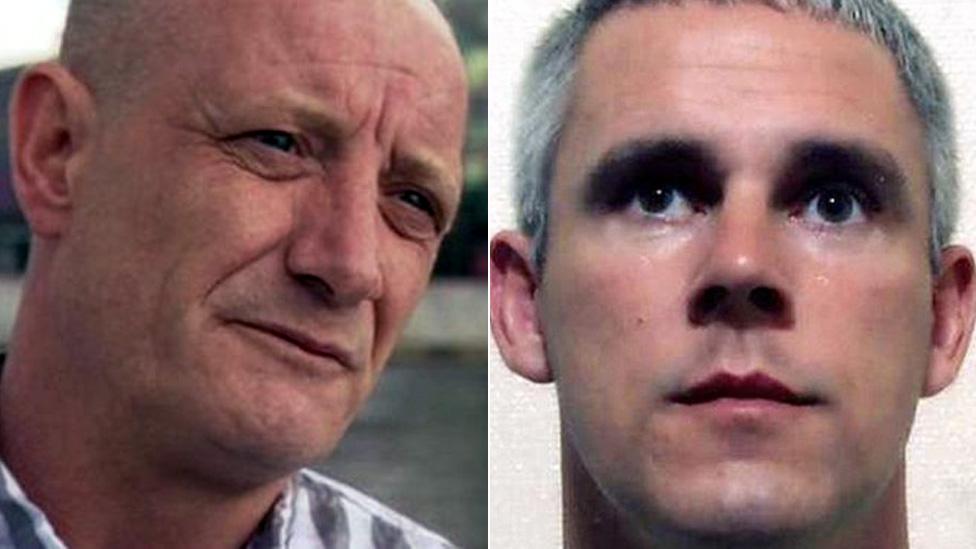Paul Massey and John Kinsella shot 'in gangland assassination'
- Published

Paul Massey (left) and John Kinsella were both fatally shot
A gangland feud led to an underworld "Mr Big" and a mob "fixer" being shot dead, a court has heard.
Paul Massey, 55, from Salford, and his friend, John Kinsella, 53, from Liverpool, were "notorious" within gangland circles in Liverpool and Manchester, jurors were told.
Both were gunned down during a deadly clash between rival north-west gangs, Liverpool Crown Court heard.
Mark Fellows, 38, and Steven Boyle, 35, both deny the murders.
Mr Fellows, of Warrington, and Mr Boyle, of Heywood, Greater Manchester, also deny the attempted murder of Kinsella's partner Wendy Owen.
Prosecutor Paul Greaney QC said Massey was killed in July 2015 and Kinsella almost three years later, in May 2018.
He said: "They were friends and associates. Moreover, each was well known, if not notorious, within the gangland of the north west and both men undoubtedly had enemies.
"Their undoing has to do with events in the city of Salford, where serious violence broke out between two criminal gangs in 2015."
The jury heard that Mr Fellows and Mr Boyle were associated with a gang led by a man named Michael Carroll.
A rival gang, which called itself "the A Team", was headed by a man named Stephen Britton who regarded Massey as "a mentor", the court was told.
'Clear parallels'
Massey was shot dead on 26 July 2015 outside his home in Clifton, Salford, by a gunman firing an Uzi sub-machine gun.
Then at about 06:45 BST on 5 May this year, Kinsella was shot dead near his home in Rainhill, St Helens, by a man on a bike, the jury heard.
The prosecutor said a man, allegedly Mr Fellows, had cycled up behind Kinsella and shot him twice in the back with a handgun and then twice to the back of the head.
Mr Greaney said there were "clear parallels" which suggested the same people carried out both killings.
Police investigating Kinsella's murder seized a GPS watch belonging to Mr Fellows, the court heard.
When detectives analysed this it showed a few months before the 2015 murder of Massey, the wearer had travelled to where the victim was killed.
The prosecution claim this showed Mr Fellows on a "reconnaissance run" for the planned gangland hit. Mr Boyle had acted as a "spotter" for both killings, the court was told.
'Gangland assassination'
Mr Greaney said both men were in contact using a phone called an Aquaris X, or similar, sold on the internet and equipped with what is called Encrochat modification, costing up to £1,500 for six months' use.
The phones have a "dummy screen" with a secret, encrypted partition which allows secret communication, the jury heard.
Without a password, the content of the handset cannot be decrypted and police have not found it possible to decrypt the defendant's handsets.
Both devices had been activated just days after the murder of Kinsella and Mr Greaney said both accused had "like devices" at the time of the killing but ditched them after the murder.
Mr Greaney added: "It hardly seems likely that they would do so because of a simple drug deal, whereas if they had been involved in a gangland assassination, it would be much easier to understand why they might wish to dispose of anything connecting them to the crime."
The trial continues.